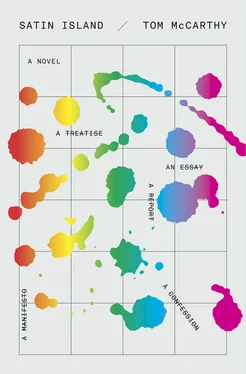7.12The iodine’s not getting any traction, Petr said the next time I met him; so they’re trying a new tactic. Oh yes? I asked. What’s that? Well, he told me, they’ve taken sample cancer-cells from me and sent them to this lab where they mix them with cells from honey, and thyme, and rosemary, and the sweat of humming-birds, and all kinds of natural things. The cells of these have quite specific structures, which react in certain ways with other structures — and, once in a while, one set of cells can neutralize another, take them out. If they find one that takes out my cells, then we’re rolling. Don’t they know already which cell-structure will suit you? I asked. No, he replied, they haven’t got it all mapped: it’s still hit and miss. You just have to pair your cells with each of these others, moving down the line, running the gauntlet, and you never know, you might just find a match. The lab’s in Greece, he said. Greece? I asked. Yeah, he answered: Greece. How about that? He paused, and I pictured this Greek lab for a few moments. I had a quite clear picture of it — only it was shedding, even as I held it in my mind, its modern, scientific ambiance and acquiring an ancient one instead: mutating into a grotto full of hecatombs and urns into which white-robed ministers served offerings of blood and flesh. Above these ministers, hovering beyond the smoke and vapour, a pantheon of gods sat around a long board table at whose centre lay a big, fat tome in which all structures and all matches had been written down. It was to them, to this Olympian committee, that these libations were being given, these supplications made — made in the hope that the committee might, in their infinite pity, wisdom and benevolence, do what only they could do: look up an entry and send back to meek, afflicted mortals a celestial ping! of recognition. Petr started speaking again, his words floating above this vision like a voiceover. It’s worth a try, he said.
7.13Talking of visions: as time went on, my mental picture of the Project, my baroque casting, or elaboration, of it, changed. Out went the towers and palaces — or rather, better to say they flattened, their balconies and arches, corbels, cornices and spires and all such wedding-cakery steamrollered down into a uniform consistency. What these second-generation reveries gave me in their place, compressed and smooth, was a black box. It might have still been standing in the desert; or perhaps up on a plateau, a raised plain — above a city maybe, like the Parthenon, or maybe situated (for strategic reasons) far from any settlement, but nonetheless connected to a city, or a set of cities, over which it exerted influence. Then again, sometimes this black box in which Koob-Sassen had become embodied seemed to be lying on the shelf of some administrative building. More accurate, perhaps, to describe it as resting on a plane , rather than plain: one geometric shape that sat atop another. As to its size: this, too, was far from clear. It was hard, in these visions, to maintain a sense of scale. Sometimes it seemed enormous, like an emperor’s mausoleum; at others it appeared no larger than a trunk, or coffin; at others still, the size of a child’s toy- or music-box. The only constant or unchanging aspect of it was that it was black: black and inscrutable, opaque.
8.1And all this time, behind these apparitions, another one: the image of a severed parachute that floated, like some jellyfish or octopus, through the polluted waters of my mind: the domed canopy above, the floppy strings casually twining their way downwards from this like blithe tentacles, free ends waving in the breeze. This last picture, for me, produces, even now, a sense of calm: no angry and insistent tow, no jerks and tugs and stresses — just a set of unencumbered cords carelessly feeling the air. This sense of calm, of languidness, grows all the more pronounced when set against the panic of the man hurtling away from it below. He would have looked up, naturally, and seen the chute lolling unburdened and indifferent above him — as though freed from the dense load of all its troubles, that conglomeration of anxiety and nerves that he, and the human form in general, represented. Considering the picture, I found my focus, my point of identification within it and my attendant sympathy, shifting from the diminutive man to his expanded, if detached, paraphernalia. I felt quite happy for the latter, for its liberation into carefreeness. Parachutes, as a rule, are treated badly by their human masters: granted false release and then immediately yanked back into servitude, into yoked bondage. This one, though, had slipped the bridle — literally — and billowed out into a freedom that was permanent and real. Its existence would have been a good and full one from this moment onwards.
8.2The following weekend, the newspaper — the old-style broadsheet, I mean — carried a longer, more reflective article about the case. Its author was an occasional skydiver himself. He discussed the culture of the sport, its general fraternity. Skydivers, he informed his readers, are a close-knit bunch. They have, he wrote, the feeling of being part of a tribe . This sentence jumped out at me, for obvious reasons; on reading it, I looked up at the byline, to see if I recognized the journalist’s name. I didn’t. I thought of my Vanuatans once again. In their tower-plunging ritual, the vines, as I mentioned earlier, were measured so as to tauten not in mid-air but rather only fractionally above the earth: the jumps deemed the best, the ones that won the diver most acclaim, were those in which the cords sprang into action as he hit the ground, plucking him back from the very jaws of death into which they’d tantalizingly allowed him, for a fraction of a second, to descend. On such perfectly realized jumps, the diver’s shoulders would flick leaves and brushwood as they jerked back upwards, as though impudently scrawling the man’s signature across the forest floor. The movement was extremely pleasing to observe. It was this act of scrawling, this graffiti-gesture, I now realized, that, above all other aspects of the ritual, had back then made me want to be a tower-plunger, or anthropologist, or both.
8.3The article kept mentioning “faith.” Skydivers are induced into and graduate up through a world in which faith plays a fundamental role. They must believe in their instructors; in the equipment; in the staff packing their rigs; in tiny ring-pulls, clips and clip-releases, strips of canvas, satin, string. It could be argued, wrote the author, that this belief had nothing of the devotional or metaphysical about it, since each of the things to be believed in had a solid evidential underpinning: the mechanics of a ripcord, say, or a spring-loaded riser — or, of course, on a larger scale, the overall infallibility of physics, its laws of resistance, drag and so on. Yet, he claimed, these things could only carry one so far towards a gaping hole in a plane’s side, and the fundamentally counterintuitive act of throwing oneself through it: to cite the clichéd but apt maxim, they could take the horse to water, but they couldn’t make it drink. That final spur, the one that carried skydivers across the threshold, out into the abyss, was faith: faith that it all — the system, in its boundless and unquantifiable entirety— worked , that they’d be gathered up and saved. For this man, though, the victim, that system, its whole fabric, had unraveled. That, and not his death, was the catastrophe that had befallen him. We’re all going to die: there’s nothing so disastrous about that, nothing in its ineluctability that undermines the structure of our being. But for the faith, the blind, absolute faith into whose arms he had entrusted his existence, from whose mouth he’d sought a whispered affirmation of its very possibility — for that to suddenly be plucked away: that must have been atrocious. He’d have looked around him, seen the sky, and earth, its landmass and horizon, all the vertical and horizontal axes that hold these together, felt acceleration and the atmosphere and all the rest, the fundamental elements in which we hang suspended all the time, whether we’ve just jumped from an aeroplane or not — and yet, for him, this realm, with all its width and depth and volume, would have, in an instant, become emptied of its properties, its values. The vast font at which he prayed, and into which he sank, as though to re-baptize himself, time and again, would, in the blink of a dilated eye, have been voided of godhead, rendered meaningless. Space, even as he plunged into it, through it, would have retreated — recoiled, contracted, pulled back from its frontiers even though these stayed intact — withdrawn to some zero-point at which it flips into its negative. Negative world, negative sky, negative everything: that’s the territory this man had entered. Did that then mean he’d somehow fallen through into another world, another sky? A richer, fuller, more embracing one? I don’t think so.
Читать дальше












